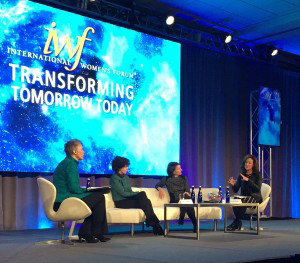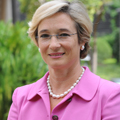 At the end of last month, I participated in the IWF World Leadership Conference. I am a board member of the association in Spain. The title “Transforming Tomorrow Today” embodied the incredible, proactive energy of the 800 Top Women from 40 countries who came together once again for the annual conference.
At the end of last month, I participated in the IWF World Leadership Conference. I am a board member of the association in Spain. The title “Transforming Tomorrow Today” embodied the incredible, proactive energy of the 800 Top Women from 40 countries who came together once again for the annual conference.
The association, founded in the United States in the 1980s, has more than 5,000 members. The conference was attended by the leaders and pioneers of numerous professional fields, including current and former heads of state, executives and board members from private industry, and association leaders. They engaged in dialogue on social, economic and business challenges and looked ahead to possible solutions. A total of 65 global experts were featured in the program schedule.
Zeroing in on key issues for the future
Covering topics such as the accessibility, cost and reliability of energy, several speakers presented advancements in the area of cleaner alternative energy sources. Other panels focused on the importance of medical data management, the possibility of ending world hunger, and women’s education as a critical lever for the development of societies.
One presentation highlighted innovation in the financial industry, in the form of new financial instruments, such as social impact bonds, which garner participation from public institutions, investors and NGOs. There was also discussion about the vital role of women in finance, whether as savers or recipients of funds, for achieving greater financial and social inclusion in developing countries. Participants examined the necessity of regulating certain financial institutions while other practices exist without the same level of protection.
Democratizing education: strong foundation the precursor to MOOCs
There was a very interesting panel on the role of online education. Key topics included massive open online courses (MOOCs) as a means to improve people’s levels of training, by eliminating the geographical or economic barriers facing students. This helps to democratize higher education and make it more inclusive, as long as access to the Internet and new technologies is provided in a nondiscriminatory manner, since there is no innovation without education.
To illustrate their impact, the former president of MIT pointed out that in just three years of existence, MIT’s MOOCs have had more students than the university has had in its entire history of traditional classroom courses.
Ana José Varela González, Managing Director of the Barrié de la Maza Foundation and Director of Banco Popular, wrote in her blog that, while these courses may democratize education, MOOCs focus on advanced phases of education. Thus, “the most important part of education is the prior years, which plant the seeds for learning and curiosity. Not much can be done without that. It’s the early years of life that provide the foundations of learning, the discipline, the effort required for studying and the mental structure on which we build our capacity to understand reality, solve problems and develop abstract reasoning. In fact, the experts say that the most important, lifelong, crucial learning is acquired from other people, especially parents and teachers (particularly during those early years).”
There was also discussion on the role of global enterprises as a driver of innovation, and the role of the governments that support them. Steven Johnson, author of the book Future Perfect, highlighted the importance of the different networks cooperating for innovation (e.g., cultural, gender, intellectual). He said they have a much more creative approach to problem solving. We live in the era of collaboration for generating knowledge. The networks with older women involved are very good. We now have a huge pipeline of overqualified women.
This familiar adage continued to inspire: “Failure plants the seeds for new learning.” That is where new hopes begin.
Ensuring a sustainable future
Three things are needed to make the shift toward a sustainable future: technology, women and diversity, and innovation.
In terms of how to transition into a more sustainable world, she shared two messages of encouragement:
- There are multiple stressors applying pressure toward producing change (e.g., political factors, climate, migration, violence).
- It’s already doable. We have the technology and business associations that take care of their people. Hence the importance of business innovation and empowering women economically.
We need the involvement of businesses and governments to strengthen society. We need entrepreneurs to target these issues and make improvements, by acting with a community of investors, stakeholders, and connecting them through philanthropy.
On Thursday, we went to dinner in groups of 10-12 at the homes of our colleagues in Massachusetts. These dine around events are organized for members to get to know one another and further expand our networking. I spent the evening with 10 wonderful women in an old, five-story house in the neighborhood of Charlestown, where we enjoyed a lovely view of the Boston skyline from the terrace… A fine way to end the day.


